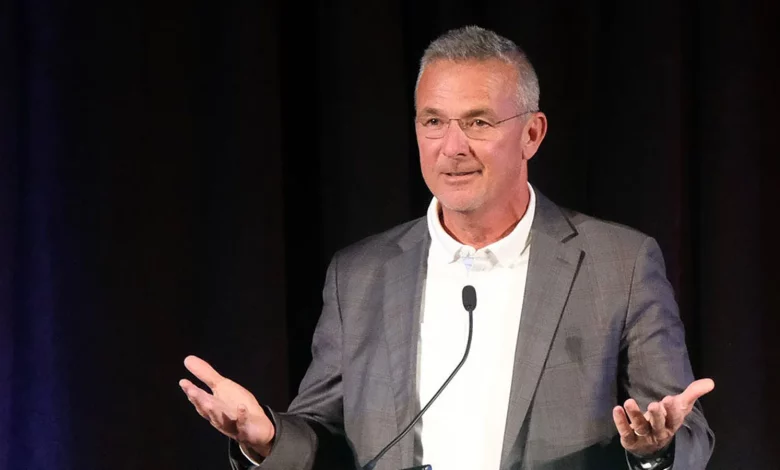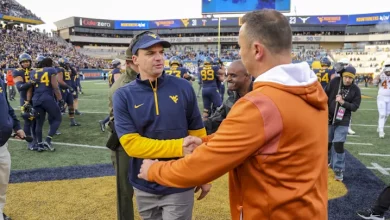Urban Meyer recalls threatening to quit Ohio State after facing pushback on his idea to hold a team ‘church service’ during practice.

Urban Meyer, one of college football’s most successful and controversial coaches, has never shied away from strong leadership or unconventional methods to build team culture. Recently, Meyer opened up about a lesser-known episode during his tenure at Ohio State—a moment when he nearly quit the program due to resistance from the administration over his proposal to hold a “church service” for the team during practice.
This revelation offers a rare glimpse into the challenges Meyer faced off the field, his passionate commitment to his team’s cohesion and mental toughness, and the cultural clashes that arose as he pushed to create a unique environment at one of college football’s premier programs.
The Context: Urban Meyer at Ohio State
Urban Meyer took the helm of the Ohio State football program in 2012, inheriting a team and fan base hungry for success. With an already stellar resume—two national championships at Florida—Meyer was expected to restore the Buckeyes to their former glory.
From the outset, Meyer focused on building a winning culture grounded not only in physical preparation but also mental and emotional resilience. He believed that team unity, discipline, and shared values were essential ingredients for championship-level performance.
The Idea: A Team ‘Church Service’ During Practice
One of Meyer’s more controversial ideas was to hold a “church service” or a faith-based gathering for the team during practice sessions. Meyer has long been vocal about the importance of faith and spirituality in his coaching philosophy. He viewed these moments as opportunities to foster brotherhood, reflection, and mental strength.
- Purpose: The proposed service aimed to bring players together in a spiritual setting, allowing them to bond over shared beliefs and recharge mentally during the grind of the season.
- Format: While details are sparse, the service would likely include prayer, inspirational talks, and possibly guest speakers from faith communities.
- Intention: Meyer intended this not as a religious imposition but as a voluntary, team-building exercise to support players holistically.
Pushback from Ohio State Administration
Despite Meyer’s good intentions, the idea faced considerable pushback from Ohio State’s administration and compliance officials.
- Concerns: There were concerns about the separation of church and state, the diverse religious backgrounds of players, and potential legal liabilities. Some administrators worried about alienating players who did not share the same faith or felt uncomfortable participating.
- Cultural Sensitivity: Ohio State is a large public university with a diverse student-athlete population, requiring sensitivity toward inclusivity and respect for all beliefs.
- Compliance Issues: NCAA and university regulations also played a role, with questions about whether such activities could be mandatory or impact practice time.
The resistance put Meyer in a difficult position—balancing his coaching philosophy with institutional policies and a diverse team.
Meyer’s Reaction: Threatening to Quit
According to Meyer’s recent recounting, the pushback over the “church service” idea frustrated him deeply. He viewed the rejection as a lack of support for what he considered a critical element of building a winning culture.
- Emotional Moment: Meyer said he felt isolated and misunderstood by the administration, believing that his vision for team unity was being stifled.
- Threat to Resign: At one point, Meyer recalled threatening to quit the Ohio State program if he could not implement his plan. This moment reflected his passionate commitment to his coaching methods and his unwillingness to compromise on what he saw as vital.
- Negotiations: Ultimately, Meyer and the administration engaged in discussions to find common ground, leading to modifications in how team bonding and spiritual support were approached.
This episode reveals the challenges coaches face when their personal philosophies intersect with institutional boundaries and cultural diversity.
The Broader Impact on Team Culture
Although the “church service” as originally envisioned was never fully implemented, Meyer’s emphasis on team unity and mental preparation left a lasting impact at Ohio State.
- Alternative Approaches: Meyer and his staff found other ways to foster team cohesion, including team dinners, leadership retreats, and motivational speakers.
- Respecting Diversity: The coaching staff became more mindful of the players’ varied backgrounds, creating inclusive environments for all.
- Mental Health Focus: Meyer’s broader vision highlighted the importance of mental health and resilience in college athletes, a conversation that has only grown in prominence.
Players from Meyer’s tenure have often spoken about the tight-knit brotherhood he cultivated, which contributed to Ohio State’s sustained success.
Public and Media Reactions
Meyer’s admission about this episode has sparked discussion among fans, media, and the wider sports community.
- Supporters’ View: Many admire Meyer’s dedication to his principles and his willingness to stand up for what he believed would benefit the team.
- Critics’ Concerns: Others point to the importance of separating personal beliefs from public university programs and ensuring inclusivity for all student-athletes.
- Cultural Conversation: The episode contributes to broader conversations about the role of faith in sports, diversity, and the evolving responsibilities of coaches.
This moment in Meyer’s career serves as a case study in navigating leadership challenges in complex environments.
Lessons Learned and Moving Forward
Reflecting on this experience, Meyer has spoken about what he learned regarding leadership, communication, and compromise.
- Balancing Vision with Flexibility: Leaders must adapt their vision to fit the cultural and institutional context while maintaining core values.
- Importance of Dialogue: Open conversations with stakeholders—administrators, players, families—are crucial for successful team culture initiatives.
- Respect for Diversity: Effective leadership embraces diversity, finding ways to unite rather than divide.
These lessons continue to resonate in college athletics and beyond.
Urban Meyer’s Legacy at Ohio State
Urban Meyer’s tenure at Ohio State culminated in a national championship in 2014 and multiple Big Ten titles. His ability to build a dominant program despite challenges is a testament to his coaching acumen.
This episode about the “church service” controversy adds depth to his legacy, highlighting the complexity of leadership roles in collegiate sports.
- Winning Culture: Meyer’s focus on mental toughness, discipline, and unity remains a blueprint for successful programs.
- Controversy and Success: Like many high-profile coaches, Meyer’s career blends controversy with unparalleled success.
- Influence on Coaching: His methods continue to influence coaching philosophies nationwide.
Urban Meyer’s recollection of threatening to quit Ohio State over pushback against his idea for a team “church service” sheds light on the tensions that arise when personal coaching philosophies intersect with institutional culture and diversity. It reveals a passionate leader’s struggle to maintain his vision in a complex environment.
While the “church service” concept did not come to fruition as Meyer originally intended, the episode underscores the importance of communication, flexibility, and respect in building a cohesive and inclusive team culture. Meyer’s tenure at Ohio State remains a powerful example of leadership, resilience, and the challenges of managing a high-profile collegiate program.
As college football continues to evolve, stories like this offer valuable insights into the human side of coaching and the balancing act required to unify diverse groups under a shared mission.









